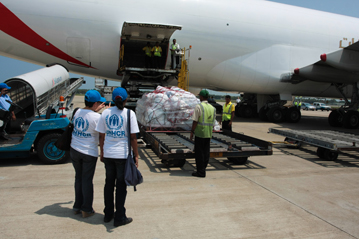Joint UNHCR-government registration starts in Eritrea's camps
Joint UNHCR-government registration starts in Eritrea's camps

MASSAWA, Eritrea, Nov 21 (UNHCR) - Refugees in Eritrea can now stand up and be counted as the UN refugee agency and the Eritrean government this week started the first-ever joint registration exercise in an attempt to improve assistance to people uprooted by conflicts in the region.
On Friday, staff of UNHCR and Eritrea's Office of Refugee Affairs concluded the first phase of the exercise in Emkulu camp near the coastal city of Massawa. The camp hosts an estimated 3,315 Somali refugees, a figure to be verified by the registration.
Emkulu's refugees had been registered before, but the just-concluded exercise will provide more detailed and updated information to be computerised for easy reference. During the exercise, each refugee family had their identity cards checked to reflect changes like newborns and deaths. The registrar took down their details - names, birthdates, date of arrival, village of origin, etc - and gave them food ration cards. Photos were also taken for new identity cards to be issued in the coming weeks.
Kabi Bernander, who oversees protection in the camp, said, "The registration is a great opportunity for UNHCR to get to know who are in the camps, how we can help them better, and how we can identify possible solutions to their long-term status as refugees."
UNHCR and the Eritrean government will use the new data to better tailor assistance and protection to the refugees' needs. The agency will also look closer at options for voluntary repatriation to certain areas of Somalia that are deemed safe for return.
"It is safe here," said Abdi, a Somali refugee who has been in Eritrea for more than 10 years. "But many people are ready to go home."
After Emkulu, registration will continue in western Eritrea's Elit camp for Sudanese refugees, and for urban refugees in the capital, Asmara. The entire exercise involving Eritrea's more than 4,000 refugees is expected to be completed by the end of 2003.









